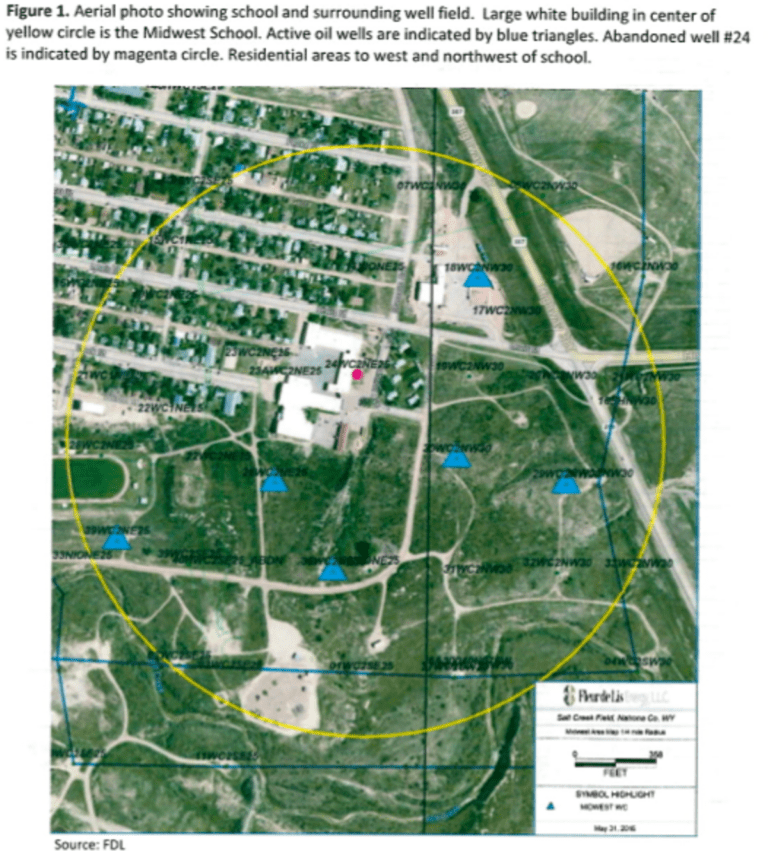Midwest School second-grader Marco O'Brien on Monday shyly but succinctly described how the woes of his school — which closed in May because of very high levels of carbon dioxide and benzene — have affected him.
“I don't like waking up early in the morning and being on the bus,” the 12-year-old told the Natrona County School District board about having to transfer to Casper.
Despite the sleepiness, the district had to close school on May 26.
The Casper-Natrona County Health Department said Monday that the Agency for Toxic Substances and Disease Registry, part of the U.S. Centers for Disease Control and Prevention, has completed a formal review of air sampling it conducted June 16 and 17.
“ATSDR concluded that the air quality events that occurred at Midwest School in May 2016 constituted an urgent health hazard and that school officials and others who determined that the school should be evacuated were correct,” the report said.
The most serious findings from the May 26 testing were very high levels of carbon dioxide, areas of the school that lacked oxygen and a classroom that had a benzene level 200 times the ATSDR guidelines.
Short-term effects of benzene inhalation include drowsiness, tremors, unconsciousness, and death. Long-term exposure can cause anemia, cancer and leukemia, the report says.
Air quality varied from day to day. Air quality during the June test dates was much better than on May 25, according to the report.
The health department said Salt Creek Oil Field owner Fleur de Lis Energy, LLC monitored the school's air quality over the summer.
FDL has found no abnormal CO2 levels since testing the area on June 6 and 17.
FDL sealed an old well next to the school. She has conducted a comprehensive assessment of every well that has been drilled within a half-mile of the school, searched for other sources of natural gas and retained an environmental consulting firm to advise her on land remediation.
The health department interviewed 139 employees and students and sent the results of those surveys to Wyoming Department of Health epidemiologists. The evaluation of these surveys will take several weeks.
Department Director Kelly Weidenbach said she has recommended the school district implement these programs: develop indoor air quality monitoring and mitigation plans, conduct another round of air quality sampling, install CO2 monitors in the school and develop a response plan if or when other air quality problems arise.
In June, FDL installed a vapor extraction system at the school, which has been effective in improving indoor air quality, Weidenbach said.
“The big concern is the benzene found in the school,” he said. “ATSDR did some calculations and found that the increased risk of cancer is very low. It's not zero, but it's very, very low. We don't expect an increase in cancer in staff and students at the school.”
But the school closing will continue to cause problems for Marco O'Brien and dozens of other Midwest School pre-K through eighth-graders who have to be on the bus at about 6:30 a.m. to drive to Casper and attend classes at Westwood Elementary School.
Likewise, students in grades nine through 12 are bused to attend classes at the new Roosevelt School/PIC (Pathways Innovation Center).
Parents also expressed frustration about the closing, like Justin Marken who wanted to know if the district would allow Midwest School to host the homecoming game on its own field.
Board President Kevin Christopherson said he would look into it.
Meanwhile, Christopher said the health department, federal and state agencies need to address safety issues.
The school will be closed this semester, but that doesn't mean it will reopen after that, Christopherson said.
Nor does it mean, contrary to rumors, that the district is considering closing Midwest School for good, he said.
“We don't even think about it,” Christopherson said. “Right now we're all looking at how to get in there and make it a viable school again as soon as possible.”

